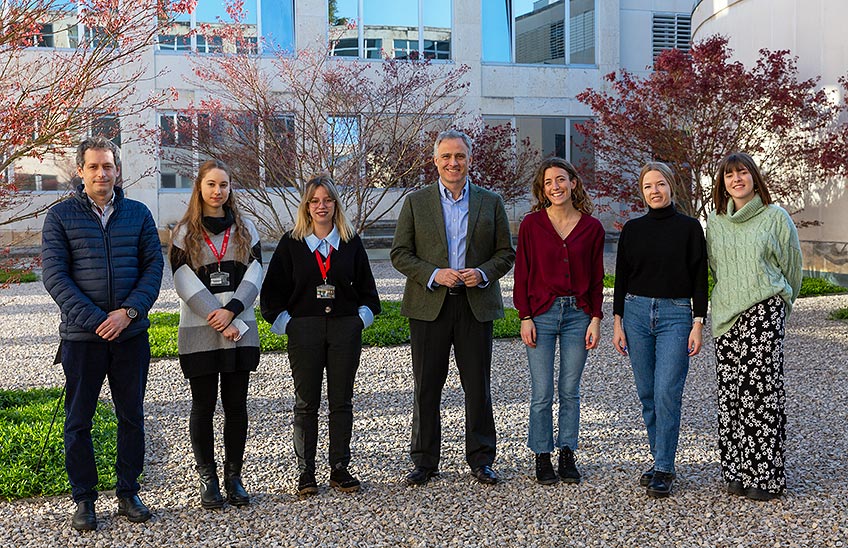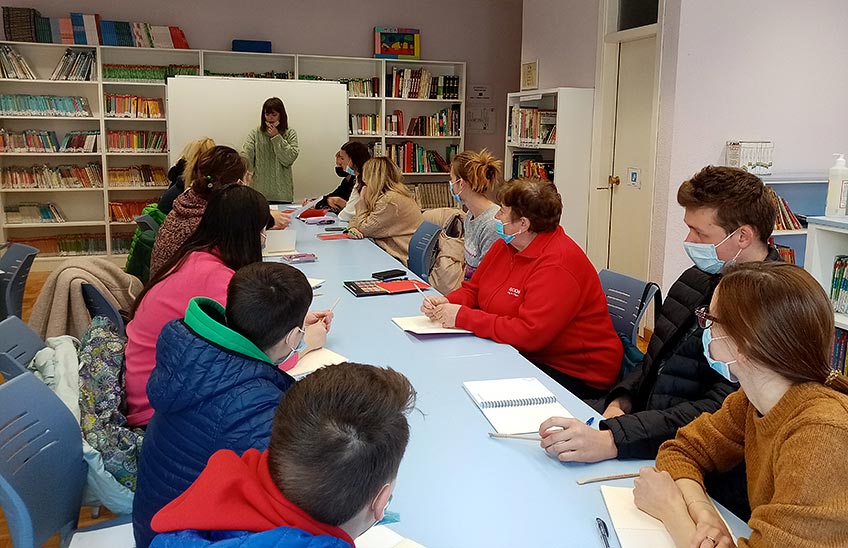News
Spanish Classes for Ukrainian Refugees
A professor and various students from the University of Navarra, through Tantaka, have organized a volunteer program to teach Spanish to the Ukrainian refugees that have recently arrived

PhotoManuel Castells/Professors and student volunteers from undergrad and master’s program in Spanish Second Language Teaching. From left to right, Carmen Nagore, Eduardo Negueruela, Irati Araiz, Álvaro Sánchez-Ostiz, Ana Pestano, Izaro Díaz, and Kateryna Dudko.
05 | 04 | 2022
More than 1,000 Ukrainian refugees have arrived in Navarra since the start of the war, according to estimates made by the provincial government. Learning Spanish is one of the many challenges for assimilation that the refugees have faced since their arrival here.
With this in mind, Álvaro Sánchez-Ostiz, a professor within the University of Navarra School of Humanities and Social Sciences , in collaboration with Izaro Díaz, a philology student; Ana Pestano, an education and philosophy student; and Kateryna Dudko, an education and psychology student, have organized a Spanish language volunteer program that aids the refugees, through Tantaka. Currently, 35 other universities are participating in the initiative.
Also participating in this project are the students apart of the MA Program in Spanish Second Language Teaching (also known as MELE) from the Institute for Spanish Language and Culture (ILCE). They will volunteer to learn the basics of Spanish language teaching to non-native speakers.
The classes began this week, with more than 50 students, adults, and children participating. Professor Álvaro Sánchez-Ostiz explains what inspired the beginning of this initiative: “[A Ukrainian couple, Tamara and Vasyl, settled in Pamplona and after 20 years became close family friends of mine. During the first few days of the war, they successfully brought to the area their daughter-in-law and two granddaughters, one four years old and the other six. Tamara asked me if I knew of anyone that would offer Spanish classes for the newly arrived refugees. I asked Tantaka, the association of the university through which this program is offered, and requested direct help from two students, Izaro and Ana. They loved the idea and spread it among other students through social media. In one hour, more than 30 students had expressed their availability to participate]”.
To channel all this help, Tantaka reached out to the government of Pamplona and requested sessions in classrooms of the Iturrama Public Secondary School. “The director of the secondary school embraced the idea with open arms and referred us the families of the child refugees that recently started schooling”, explains Álvaro Sánchez-Ostiz.

The first day of classes with the refugees.
Trained Volunteers
The volunteers are receiving training from students of the MA program in Spanish Second Language Teaching. “They have had a workshop to develop curriculums, differentiated objectives for classes of children and adults, materials that professors can use, basic didactic strategies… We needed a minimum amount of knowledge to truly help the families: trying to teach Spanish for “immediate necessity”, in a mode of learning where adults received conversational and written Spanish training to gain more independence and where the children that are still learning have extra support”, he states.
The idea of the training initiative came from Silvia Aguinaga, professor through ILCE, in which students Irati Araiz, Carmen Nagore, Sarah Gielink, Leah Rogstad, Mariana González, María Vásquez, Adela Pardo, Henry Hinchey and Marta López-Tamés participate. In addition, ILCE has promoted the “Donate your book!” campaign, where international students that have finished their Spanish courses donate their books to better serve these families.
The volunteers that will teach the Spanish class will rotate so that they can incorporate new students and other interested people, but more importantly, so they can also focus their time on the start of exams that occur during the final week of April. “I foresee that more families are going to sign up and we will need more volunteers that can fill in the gaps that will be created. Especially in groups of adults during these three weeks”, explains professor Sánchez-Ostiz. To participate, you must contact Tantaka, which deals with the more technical and legal aspects of the classes. You can reach them at: tantaka@unav.es.
Information
ilce@unav.esIsmael Sánchez Bella Building
31009 Pamplona, Spain
+34 948 425 600 | Ext: 802361
